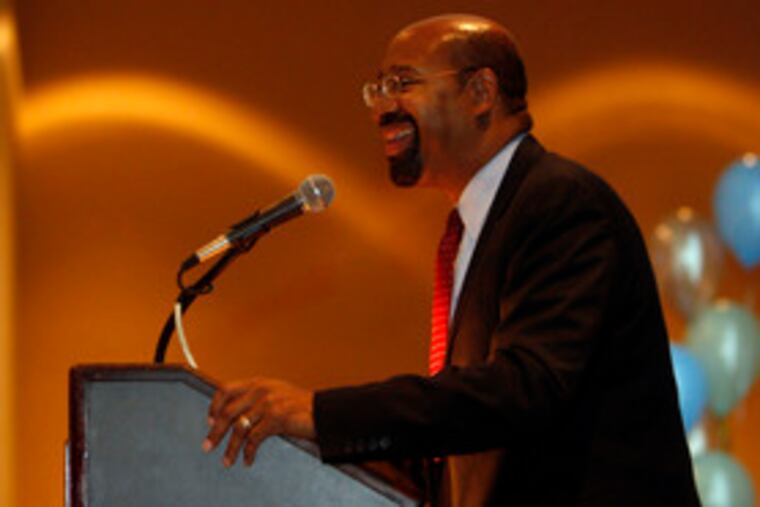Nutter: Great ethical expectations
Speaking to a "citizens convention," the mayor-elect vowed to end shoddy ethical practices that damaged Phila.'s reputation.

With a reference to the FBI bug that cast a shadow over Mayor Street's second term, Michael Nutter yesterday promised to operate an ethical government and bury the notion that Philadelphians are "corrupt and contented."
Speaking to a "citizens convention" that marked the conclusion of the Great Expectations civic-engagement project, the mayor-elect vowed to end shoddy ethical practices that damaged the city's reputation and sullied the business climate.
Without naming Street, Nutter conjured memories of the 2003 federal corruption investigation in which a listening device was installed in Street's office. Nutter pointed out that he appointed three former federal prosecutors on Thursday to join his administration as an ethics team, and one of them will work in his office as chief integrity officer.
"There will be no need to put any devices in the mayor's office, because I'm about to put a former U.S. attorney in the mayor's office," Nutter told the audience of more than 500 people at the Convention Center.
"To our public employees, our business people and our citizens, this is what I have to say: Do your job, do not rip off the government or you are going to jail."
Nutter, the former city councilman who will be inaugurated on Jan. 7, drew sustained applause from neighborhood activists and good-government advocates who were largely on his side.
The yearlong Great Expectations project, sponsored by The Inquirer and the University of Pennsylvania, solicited the input of civic leaders and ordinary citizens to identify key issues that require attention in order for Philadelphia to become the "Next Great City."
With the project's findings published and in hand, the bulk of the program yesterday was devoted to individual sessions in which the participants discussed the 12 major topics of the "citizens' agenda," including arts, taxes, city services, crime, education, environment, neighborhoods, poverty and transportation.
The citizens' agenda is remarkably similar to Nutter's agenda - unsurprising since Nutter played a prominent role in the project following his May Democratic primary victory.
The confab came at perhaps the moment of greatest expectations, in the month before the incoming administration has yet to encounter the realities of governing a post-industrial city with aging infrastructure, endemic poverty, high taxes and low self-esteem.
"Now, at this unique moment in time, our paths and your goals and my goals and our collective goals are now crossing each other," Nutter said.
In a wide-ranging speech in which Nutter appeared to diverge from his prepared text and riff extensively, the mayor-elect invoked Oscar Wilde and Harold Melvin and the Blue Notes: "It's time for us to wake up. We've done enough dreaming."
He gently tweaked the project's sponsors over their implication that Philadelphia only aspires to greatness.
"This is a great city," he said. "It's not the
next
great city. It
is
a great city. Only in Philadelphia would we be talking about being the
next
great city. So let us raise our expectations because they've been too low for too long."
Of the various topics on the project's agenda, Nutter concentrated on three - public safety, education and the tax rate, particularly on small businesses.
Nutter touted his appointment of former Washington Police Chief Charles H. Ramsey as the next police commissioner, and promised immediate action to reduce violent crime. "We need to make sure the police department can do everything possible, within the law, but also aggressively, to make this city a safe city," he said.
A longer-term strategy on crime prevention will involve improving the educational system, he said. "We cannot ignore the connection between the lack of funding for education and the out-of-control crime rate on our streets," he said. "They are intricately linked together."
But it was Nutter's remarks on the "overarching" subject of ethics that generated the most enthusiastic audience response.
"We're going to end the notion that somehow, someway, someone in the back room has their thumb on the scale, or has a hookup or a connection or is getting something that somebody else isn't getting because they don't know the right person," he said.
"Those days are over."